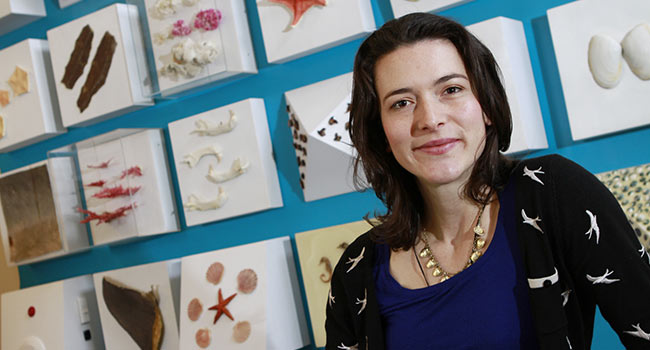
Sunkita Howard
Otago's Sunkita Howard has attracted a Fulbright Science and Innovation Graduate Award for her PhD research into whether weak electricity can deter sharks from longline fishers' bait.
The award enables her to spend a year in the US at the Virginia Institute of Marine Science studying sharks' physiological responses to weak electricity. She will be working with US fisheries expert, Dr Richard Brill who wrote one of the first papers about using weak electricity to scare sharks away from fishing gear.
Simultaneously, Sunkita will be applying her passion for art to her work, creating etchings and poetry based on her research.
"I decided to make my art part of my marine science research."
“I have always loved art and poetry,” Sunkita says. “But when I was getting more into my studies, I found I was doing less art and writing. I decided to make my art part of my marine science research, exploring the ideas of American artist and teacher Betty Edwards. She argues that the parts of the brain you use when you are doing a visual task are different from those you use when you are problem solving with verbal or written task.
Mixing art and science
“So, every time I do an experiment, I do a sketch to go with it, then when I'm working on an etching based on that sketch, I place a research problem I am exploring to the front of my mind and see if some new insight arises from the creative process.”
Sunkita completed her undergraduate biology degree at the University of Canterbury and her Masters in Biology at Auckland University. She was drawn to Otago for her PhD by the reputation of her main supervisor Associate Professor Mike Paulin.
“His skill set is amazing for this research,” she explains. “Mike has a background in studying sharks' electric sense and he is a real whiz with electronics and mini-robotics, so he is teaching me about building our electric shark deterrent device.
An extra sense
“Sharks have an extra sense that detects electricity much weaker than most fish can feel, so tiny electric fields might deter sharks without affecting fishers' targeted catch. Scientists have shown that electricity produced by magnets or rare earth metals can reduce shark catch rates, but not consistently. By electronically controlling the electric field used, it might be possible to develop a shark deterrent that is effective and practical enough for use in commercial fisheries.
“Mike will be coming to Virginia for a few weeks to work with Richard and me so we can benefit from his experience with electro-physiology techniques.”
In future, Sunkita is keen to work within the fishing industry to improve some of the sustainability issues it faces, particularly in the area of reducing by-catch.
“I also aim to have an exhibition after completing my PhD,” she says.
Sunkita is keen to hear from other scientists who are interested in using art to explore and communicate scientific ideas. Email: sunkita.howard@otago.ac.nz
An e-newsletter for people interested or involved in postgraduate study at the University of Otago
Archive
Subscribe
The Otago Post is distributed via email three times a year.
Subscribe to the Otago Post.
